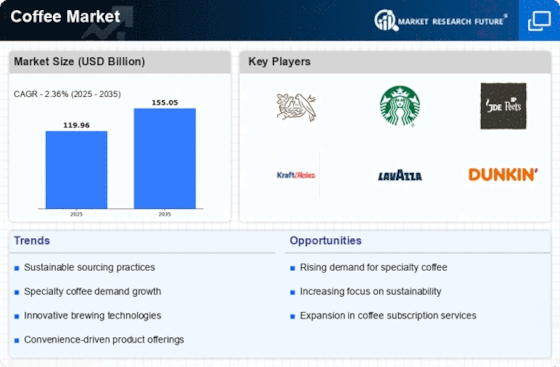Market Trends
Key Emerging Trends in the Coffee Market
The global coffee market is a dynamic and thriving industry that revolves around the cultivation, trade, and consumption of one of the world's most beloved beverages. Market dynamics within the coffee industry are influenced by a multitude of factors, ranging from geographical conditions to changing consumer preferences and global economic trends.
Geographically, the coffee market is deeply impacted by the regions where coffee is grown. Coffee is primarily produced in countries within the "coffee belt," located between the Tropics of Cancer and Capricorn. Variations in climate, altitude, and soil quality contribute to the distinct flavors and characteristics of different coffee varieties. The market dynamics are influenced by the supply chain intricacies, including cultivation, harvesting, processing, and exportation of coffee beans from these diverse regions.
Consumer preferences play a pivotal role in shaping the coffee market. The industry has witnessed a significant shift in recent years towards a more discerning and knowledgeable consumer base. Specialty coffee, characterized by high-quality beans, unique flavors, and ethical sourcing, has gained prominence. As consumers become more educated about the origin and production methods of coffee, there is a growing demand for transparency and sustainability throughout the coffee supply chain.
The role of technology in the coffee market cannot be understated. The rise of coffee shop chains, mobile ordering apps, and at-home brewing technologies has transformed the way consumers access and enjoy their coffee. Technology has also played a crucial role in coffee production, with innovations in farming techniques, processing methods, and quality control contributing to the overall improvement of coffee quality and consistency.
Market dynamics are significantly influenced by the coffee retail sector, where cafes and coffee shops contribute to the overall consumer experience. The "coffee culture" has become a global phenomenon, with cafes serving as social hubs and spaces for work and leisure. The success of coffee shop chains often depends on their ability to adapt to changing consumer trends, offering a diverse range of coffee options, including specialty brews, flavored drinks, and plant-based alternatives.
Global economic factors, including currency exchange rates and commodity prices, impact the cost of coffee production and trade. Coffee is a commodity traded on international markets, and fluctuations in prices can affect the profitability of coffee farmers and the overall economics of the industry. Economic conditions also play a role in shaping consumer spending habits, influencing whether consumers opt for premium or more budget-friendly coffee options.
Sustainability has emerged as a key driver in the coffee market dynamics. As environmental and social consciousness grows, consumers and industry stakeholders are placing increased emphasis on sustainable practices. This includes efforts to promote fair trade, reduce the carbon footprint of coffee production, and support initiatives that benefit coffee-producing communities. Sustainability practices have become a competitive advantage for coffee brands, influencing consumer loyalty and purchasing decisions.


















Leave a Comment